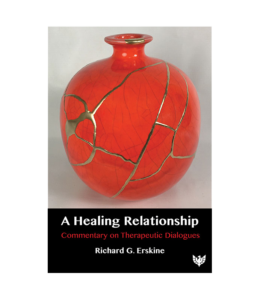
Richard G. Erskine, PhD, Training Director at the Institute for Integrative Psychotherapy, is a clinical psychologist with five decades of experience in the clinical practice and teaching of psychotherapy. He has specialised in the treatment of severely disturbed children, run a therapeutic community in a maximum security prison, and conducted his psychotherapy practice in New York City specialising in the treatment of obsession, dissociation, narcissism, and schizoid processes. For more information on Richard and his work, please visit his website.
Here Richard explains the uplifting philosophy beneath his groundbreaking new creation, A Healing Relationship: Commentary on Therapeutic Dialogues.
My latest work is both a book and four hours of video that reflect the Zen philosophy of Kintsukuroi (sometimes called Kintsugi), the Japanese art of repairing broken pottery with gold. This unique art form is based on the idea that when a ceramic bowl or vase breaks it can be repaired with precious metals and made as good as, or even more beautiful, than before the breakage.
In a relationally focused integrative psychotherapy we embrace a similar philosophy when we empathically acknowledge, validate, and normalize the damage our clients may have experienced from living in families and school systems where there was overwhelming relational distress and cumulative neglect of the child’s relational needs.
 In the book, A Healing Relationship: Commentary on Therapeutic Dialogues (and even more evident in the accompanying videos), you will see a unique philosophy of a of a relationally focused integrative psychotherapy applied in action with actual clients. To prepare you for the experience, I will briefly identify eight philosophical principles that form the foundation of the theory and methods central to relationally focused integrative psychotherapy. These principles reflect the value system and attitudes toward the practice of psychotherapy that are illustrated in my book, in my therapeutic work with clients, in the practice of supervision, and in my teachings about psychotherapy and counselling:
In the book, A Healing Relationship: Commentary on Therapeutic Dialogues (and even more evident in the accompanying videos), you will see a unique philosophy of a of a relationally focused integrative psychotherapy applied in action with actual clients. To prepare you for the experience, I will briefly identify eight philosophical principles that form the foundation of the theory and methods central to relationally focused integrative psychotherapy. These principles reflect the value system and attitudes toward the practice of psychotherapy that are illustrated in my book, in my therapeutic work with clients, in the practice of supervision, and in my teachings about psychotherapy and counselling:
• All people are equally valuable. It is the responsibility of the psychotherapist or the counsellor to find ways to value every client, even if their behavior or what motivates them is not understood. This involves respecting their vulnerability, as well as their attempts at being invulnerable, while maintaining a therapeutic relationship that fosters a sense of security.
• All human experience is organized physiologically, affectively, and/or cognitively. Our biological imperatives require that we make meaning of our phenomenological experiences and that we share those meanings with others in relationships.
• All human behavior has meaning in some context. All problematic behaviors serve some psychological function, such as reparation, prediction, identity, continuity, stability, or enhancement. Before focusing on behavioral change in therapy it is essential to know and appreciate the client’s phenomenological experiences and to inquire about the various psychological functions that their behaviors serve.
• Internal and external contact is essential for human functioning. In integrative psychotherapy, one of the definitions of psychological health is the ability of an individual to be aware of both internal and external processes.
• All people are relationship-seeking and interdependent throughout life. Interpersonal relationships are essential throughout the entire life cycle; they are the manifestation of a biological imperative that provides a basic motivation for human behavior.
• Humans have an innate thrust to grow. There is a natural force within people to grow, heal, and explore; to express the human capacity to be all that one can be.
• Humans suffer from relational disruptions. A developmentally based, relationally focused, integrative psychotherapy emphasizes a non-pathological perspective in understanding people’s behavior.
• The intersubjective process of psychotherapy is more important than the content of the psychotherapy. Intersubjectivity refers to the synthesis of two people sharing an experience together; each is influenced by the other. The therapy process is co-created. Therefore, no two psychotherapists or counsellors will ever do the same psychotherapy—each psychotherapist or counsellor is idiosyncratic in how they interact with their clients. The therapist’s attitude and demeanor, the quality of the interpersonal relationship and involvement, are just as important, sometimes even more so, than any specific theory or method.
This book is about a relationally focused psychotherapy, how I work, and why. The heart of this book are the transaction-by-transaction examples of what actually occurred in the psychotherapeutic dialogue. It is composed of three verbatim transcripts along with annotations about what I was thinking and feeling when I engaged in psychotherapy with each client. Many of my annotated comments as well as the actual therapeutic dialogue will describe some elements of the process of relationally focused psychotherapy and the reasoning behind my therapeutic comments, silences, and challenges.
I hope that reading A Healing Relationship: Commentary on Therapeutic Dialogues is an enriching experience for you. I look forward to the time when we can discuss your ideas together.
Enjoy.
Richard Erskine
Vancouver, Canada
February 9, 2021
